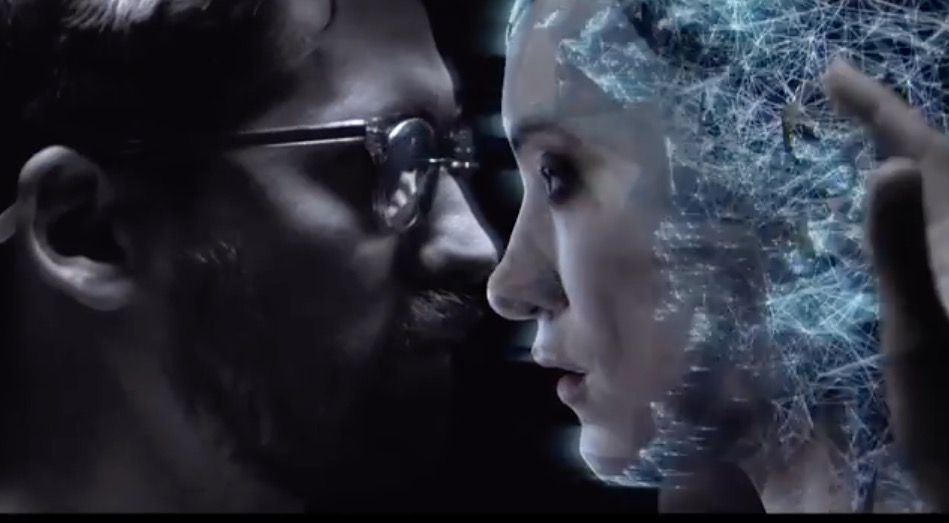By Chlotrudis Independent Film Society
Rating: 4 cats
Director: Benjamin Dickinson
Starring: Alexia Rasmussen | Benjamin Dickinson | Dan Gill | Nora Zehetner | Reggie Watts

Country: united_states
Year: 2016
Running time: 97
IMDB: http://www.imdb.com/title/tt3277624/?ref_=nv_sr_1
Jason says: “There’s a plot to CREATIVE CONTROL to go with its speculative elements, but truth be told, it’s not at its strongest when either of those are front and center. Instead, it sings when the filmmakers find nifty little scenes that can be attached to those things, creating a moment that is true despite being absurd, satiric, stylized, or futuristic. By the time the film concludes, the lines that stretch from stay to finish don’t much matter, but most everything in between is well worth it.
“Those lines involve David (Benjamin Dickinson), an advertising man in the Brooklyn of the near future whose newest assignment is Augmenta, a next-generation set of augmented-reality glasses that he proposes marketing as a creative tool, commissioning eccentric multimedia artist Reggie Watts (Reggie Watts) to demonstrate their capabilities. He also gets a demo version to use for research, though another layer over reality may not be what he really needs: He’s already popping pills, feeling disconnected from his yoga-instructor girlfriend Justine (Nora Zehetner), and maybe developing a crush on Sophie (Alexia Rasmussen), the girlfriend of his buddy Wim (Dan Gill). Not that he necessarily realizes this until he’s creating an Augmenta avatar based on Sophie.
“Star Benjamin Dickinson also writes and directs, and almost treats the film akin to its new technology at the start, introducing his main handful of characters with quick capsules of who they are, what they do, and how they are related to the others, a tutorial that cuts between them quickly enough to present them add together even when scattered across the city. Once that’s established, Dickinson can start actually using these people for odd little scenes that build upon each other, seldom having to actually stop and explain anything. It’s a good match for the dry comedy that serves as the film’s backbone, allowing Dickinson and co-writer Micah Bloomberg to get to some fairly absurd places without spending much time worrying about explaining the joke or grounding it.
“Not that a whole lot of grounding is particularly needed; the main visible reminder that this is the future is that phones have evolved into transparent slabs of acrylic. Dickinson and cinematographer Adam Newport-Berra do shoot in sharp black-and-white (with a couple moments of spot color), getting a bit of the same effect as Godard got in ALPHAVILLE, where the slight blanket unreality lets the little things that are different fit in. Dickinson and the visual effects crew at Mathematic (notably credited up front as a production company in addition to where the tech guys usually show up in the end credits) do
a really terrific job of making the Augmenta interface feel real and usable, but more than that, having an understanding of what the near future will be like. Early on, David smugly tells someone that he is zipping through a computer interface more easily because he’s younger, and it makes me wonder how a scene late in the movie where the audience sees David’s attention being divided as Augmenta feeds him a video call, multiple text conversations, and a non-linear editing application plays to various demographics. It’s initially overwhelming, but it also goes on long enough that the audience should be able to pull most everything out of this POV shot, and get what David is focusing on our discarding.
“Not everything is all about the tech, though. As much as David is the clear main character, Sophie is often the one that’s most fascinating to watch; she’s introduced with comments about her youth and a look at her designing clothes, so it’s worth noting that her costume choices as the film goes on become more powerful and confident, highlighting just what sort of success she’s finding as a woman both Homunculus (the marketing company) and on her own. That David’s avatar based upon her becomes more sexualized and compliant as the real Sophie matures makes for a strong contrast, and that David winds up confusing the two quietly helps define both characters.
“The cast by and large does nice work, with Dickinson especially doing a nice job of making David kind of smug without actually being abrasive enough to really get on the viewer’s nerves. He’s funny and the audience can get into his head without having to like his decisions. Alexia Rasmussen makes an arch foil, and witty enough on her own that she never gets sick in strict straight-man duty. Nora Zehetner does nice work as Juliette, a contrast with Sophie in that she never really matures but manages to be a funny mess at times. Reggie Watts is deadpan gold whenever he appears, and the film is liberally sprinkled with offbeat characters who all contribute to the film’s quiet absurdity.
“There’s a story in there about David becoming obsessed with Sophie(s), and when last few minutes are presented as if David’s relationships are what the audience is looking to see resolved, things fall a bit flat. Fortunately, there’s an hour and a half of amusing, occasionally clever connected bits before that, and the film almost never fails victim to letting is shortcomings (or those of its characters) define it better than what’s done well. 4 cats
“Screened 21 March 2016 at AMC Stonebriar #2 (first-run, DCP)”
Jeff says: “A somewhat cerebral science fiction story about an ad exec who uses virtual/augmented reality to conduct a sort of affair with his best friend’s girlfriend. Pretty good, small budget fx, and Benjamin Dickinson effectively portrays a technologically induced slide into madness.”
